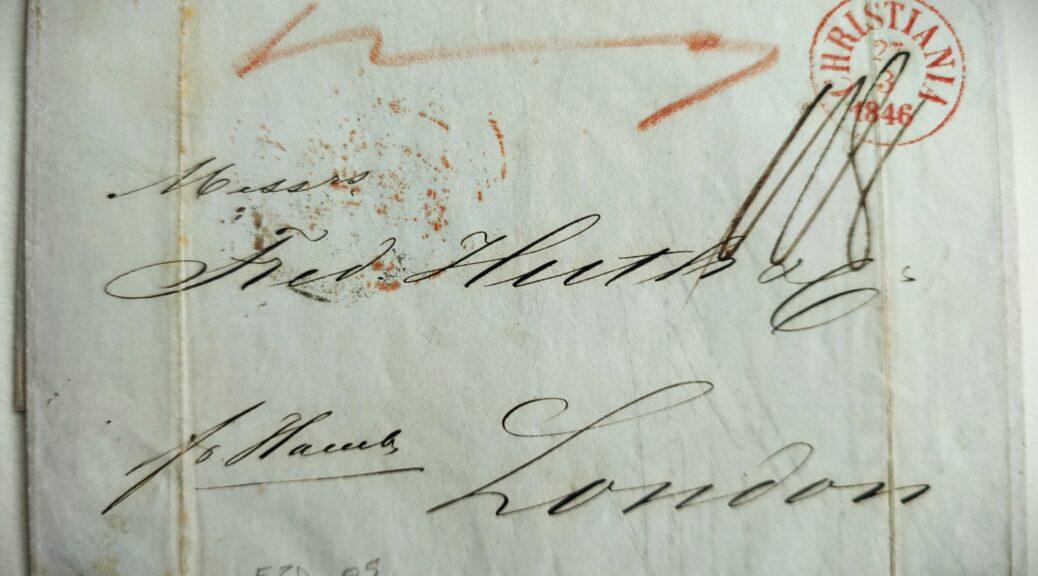
Point to Paper – The worlds first global bank had 31 correspondents in Norway before 1850
Look closely at the first picture in today’s story. The letter is addressed to Fredrik Huth & Co. in London. The envelope is stamped in Christiania. The letter is written the 27th of March 1846. It is from a business partner and friend. It is signed by a famous banker in Norway in the 19th century. His name was Andreas Grüning. I will get back to him shortly. The letter is clear evidence that the worlds first global bank had close connection to Norway.
Today’s story is first of all about a hard-working young man named Frederick. He started his career as an apprentice at a trading house. Since he became a permanent employee. At a young age, he quit his job and chose instead to establish his own business. As the company developed, it became a global trading house and a global bank. You may have heard of those who started with two empty hands. Those stories are rarely true. The man you are about to meet is an exception. He grew up in a family that was barely supported by his father’s job. The father worked as a poor tailor. He was a former soldier. He took whatever work he could get.
Frederick was born in 1777 and the family chose to move to Harsefeld outside Hamburg the year he turned four. He had to get a job at the age of 14 to support his family. He became an apprentice in an import and export company. He was lucky. He got both a job and an education. As part of the deal, Frederick was allowed to attend business school twice a week. He started as an apprentice in 1791. It was to be the beginning of an adventurous career. The company he worked for was the Basque trading house Bretano Urbieta & Co. in Hamburg.
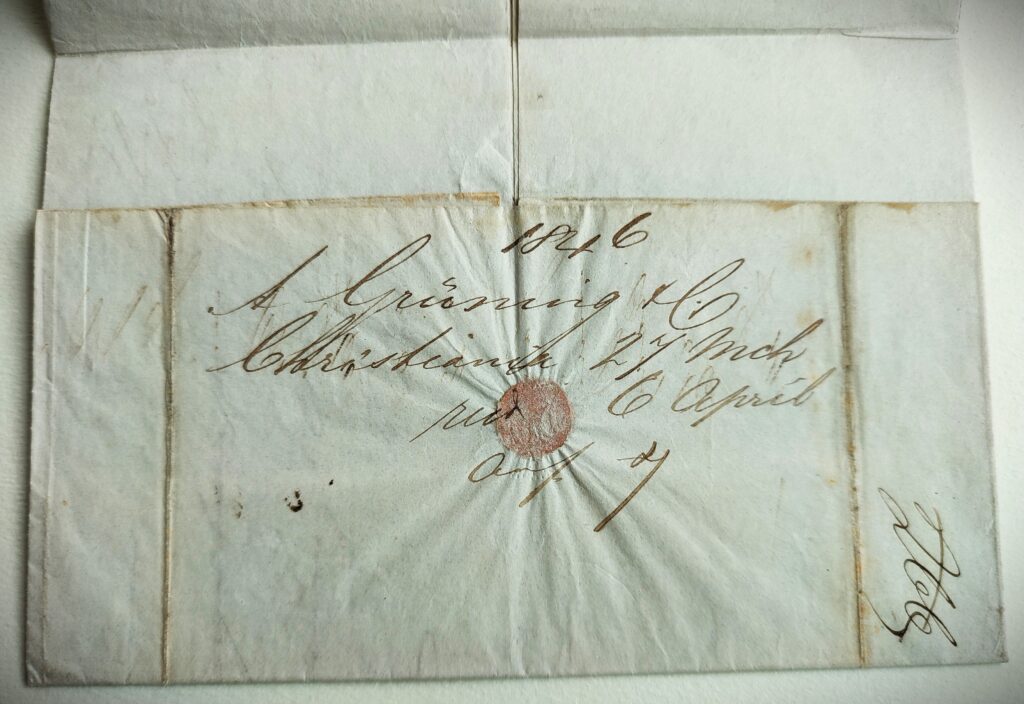
Today’s story will move all around the world, starting in the big cities of Hamburg and London. You will see that there are clear connections that stretch all the way to the Norwegian cities of Christiania (Oslo), Sarpsborg and Drammen. We will also follow a celebrity couple traveling in Norway in 1839 and a get acquainted with a famous party of national importance in Grüner’s garden in Christiania in 1840. The Norwegian connection is important. You will see that Huth & Co. and his business partners were close to key people, businesses and places in a critical transition period for the country. At the very end, you will get to read a letter that has not been read for 183 years. The letter is like a time machine. It provides a window back in time. It offers you a direct encounter with the person who wrote it in 1839. The letter was important. It was one of the seeds that grew in to the future trade between Venezuela and England. The letter has many references to businessmen from Manchester.

I wonder what Frederick’s father would have thought the day he was walking home from the battlefield. What if he could have seen into the future. The near future promised only a hard life of barely making ends meet for the family. The more distant future was full of hope and surprises. I also wonder what the 14-year-old Fredrik was thinking the day he had to move from home. What if he had known anything about the direction his life would take. Life is certainly strange and the range of our actions are hard to fathom.
The author Manuel Llorca-Jaña (2016) has written the very interesting book with the title The Globalization of Merchant Banking before 1850 – The case of Huth & Co. The book has been a very important source for this article. Llorca-Jaña claims that Frederick Huth was the actual person that started globalization. Think about that! Until 1850, there were many people that were active in international trade and banking, but Frederick was the first to take this to a global level. Until then, international trade mainly consisted of trading with fixed suppliers and customers in fixed countries. The contact persons at both ends often consisted of people from the same family. Deployment of family members to the country with which one was to trade was often a prerequisite for success. Frederick was different. He traded with many countries and in many parts of the world. He built up a network of contacts that would have been impossible if he had only chosen to focus on his own family.
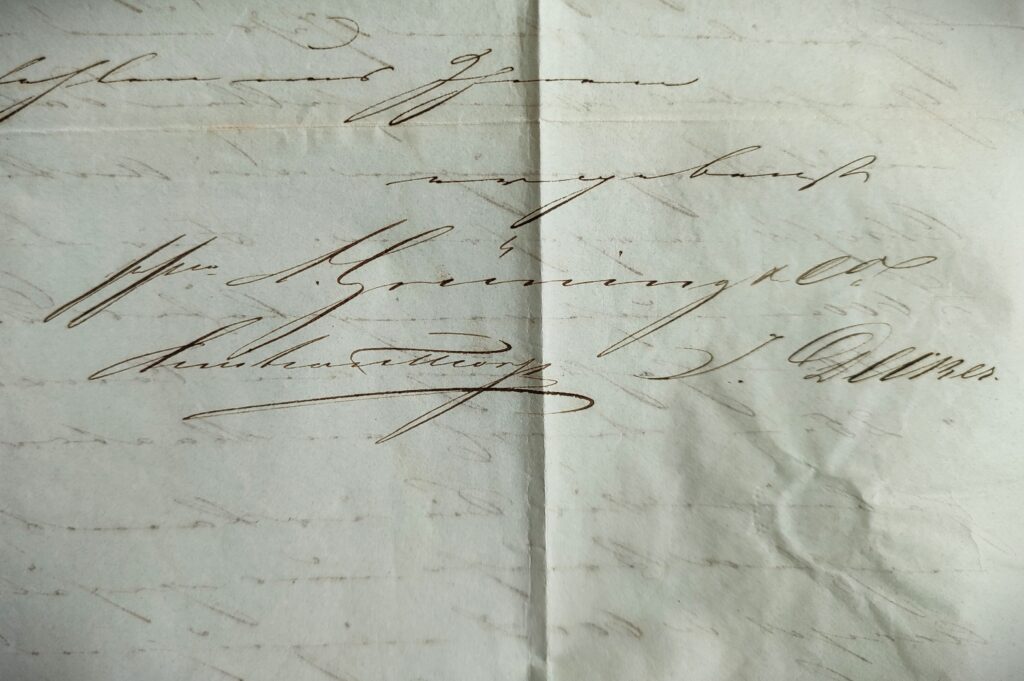
Frederick Huth became a global trader and banker. He did it with a fountain pen, paper and people he trusted. Try to imagine establishing and running a global bank before email, the fax, the telephone, the telegram and even before the postage stamp was invented? Everything had to be written by hand. The letters had to be sent on dangerous and vulnerable journeys by sailing ship, on horseback and on foot. It was one thing to send a letter to the neighboring town in those days. It was something else to run a global network on all continents, in more than 70 countries, in over 600 cities and with over 6,000 contact persons.
Try to imagine what that meant in practice. A letter from the head office in London, that was sent to the branch office in Lima, would take at least two months one way. Imagine if you were to communicate with a colleague or a business partner and you knew it was going to take at least four months before you could expect a response? It’s easy to find current examples of people who think it’s rude not to have received a response by the afternoon to an email they sent in the morning of the same day. The trust, patience and courage required of Frederick to conduct business in this way is hard to fathom.
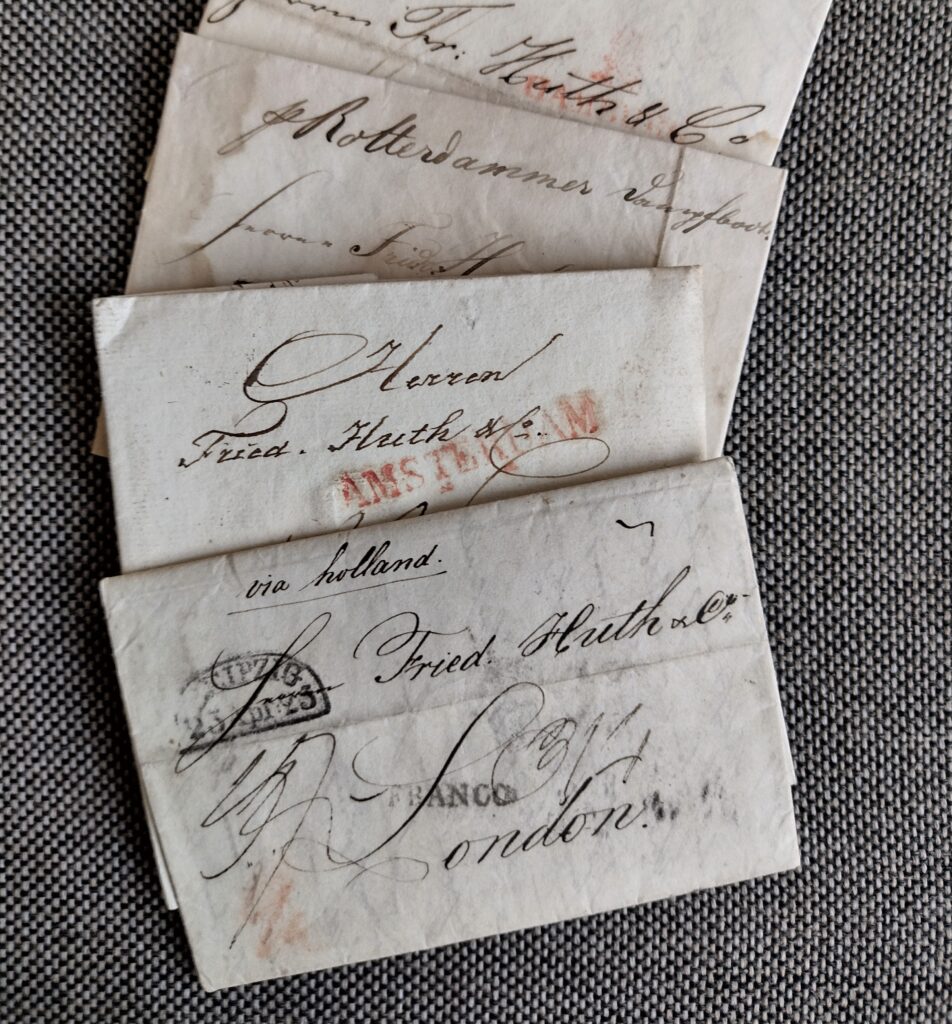
Frederick Huth can be claimed to be the one who started globalization for several reasons. Not only did he communicate and trade with many people in many cities around the world, but he also contributed to the development of this way of doing business. Huth not only traded and sold himself, but he also helped many others to do the same.
The firm Frederick Huth & Co. contributed not least to reducing the risk of buying and selling something far away. They sold insurance, they arranged advances, they obtained financial partners and they moved money. That made Huth & Co. so much more than just a local trading house and a local bank. Frederick knew what he was doing. He had worked in the business since he was 14. He knew how difficult it could be to run out of money and thus miss out on a good deal. He knew full well that there could be delays in business operations because a customer could not pay quickly enough. He had experienced the consequences of ships sinking and warehouses burning to the ground. He knew that even if you were lucky enough to escape water damage, rats or pirates sometimes even a poorly timed war could destroy a good trade and break the back of a business.
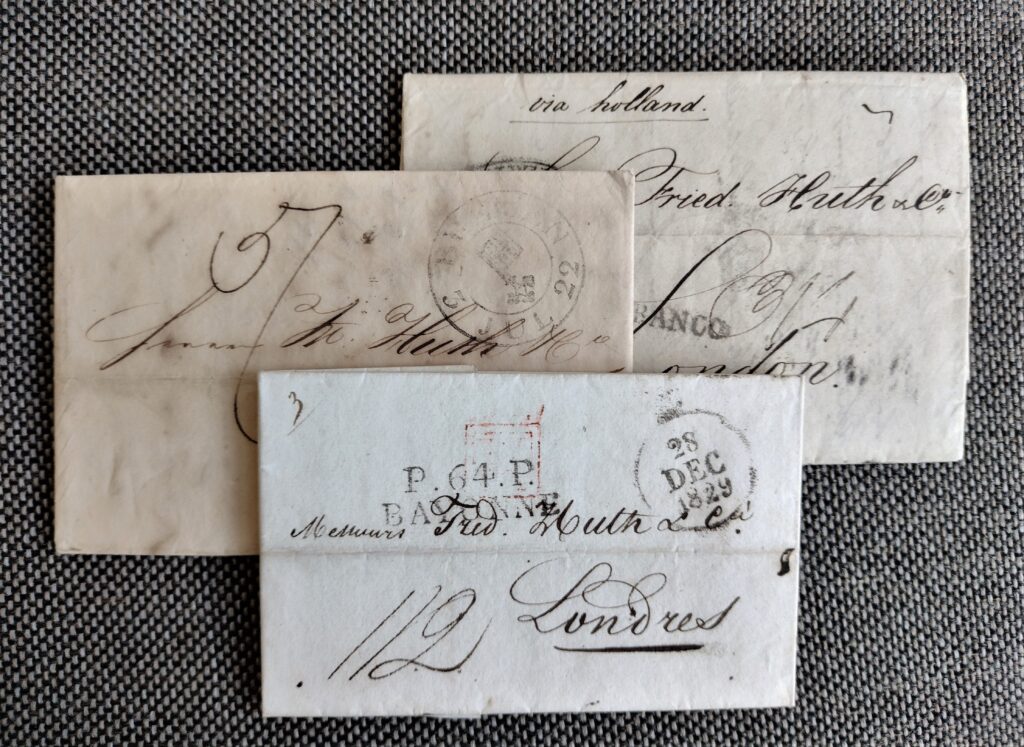
Frederick became like oil in the emerging global trade machinery. Perhaps a German businessman had come across a batch of quality timber at a good price in Norway and wanted to try to sell it in Spain. The German had seen an opportunity. Huth & Co. could help him pay for the goods. They could also arrange insurance so that the German trader dared to send the timber by sailing ship and store it in a warehouse on arrival to Spain. Perhaps it was also Huth & Co. that contributed on the other end of the deal and helped the Spanish buyer with a loan. This loan made it possible for him to buy the timber and pay back as the stock was sold. The German could get his money swiftly and directly from Huth & Co. For a small commission of course. Huth was known for not being greedy. It was never more than a few percent. All this made Huth & Co. a popular and sought-after driving force for the development of globalized trade. Just as important as buying and selling globally was getting the money and insurance to make it possible. Just as important as doing this yourself was contributing to others being able to do the same. The dimensions and complexity of this business is difficult to take in. Especially considering that it all took place before 1850 and before anyone else dared to do the same.
This feat is so spectacular that one would think that the story of Huth & Co. had been told many times. Surprisingly few have shown interest. Almost no one has written about Huth & Co. in the period before 1850. Manuel Llorca-Jaña (2016) is an exception. He has plowed through old archives full of letters from the company and written an impressive history book about the bank. Today’s story is, as mentioned earlier, largely based on his book.

So how did I come into contact with this? Amazingly, many of the letters the company sent and received 200 years ago are actually available for purchase. Those who have read my previous posts know that I am constantly looking for new adventures based on old letters . I came to know the business letters of Huth & Co. by chance. I knew nothing about the bank until I saw one of the letters for sale on eBay. For the price of a hamburger, I had the opportunity to buy an original letter which turned out to be written to the bank that started global trading and banking. I didn’t know that when I bought the first Huth letter. I jumped at it because I thought it had great handwriting. I was soon to discover that I had become the owner of an important historical document.
It’s hard to resist the temptation to buy old beautiful letters. The letters sent to Huth & Co. have proved to be relatively easy to obtain. It has been slightly harder to obtain letters sent from Huth & Co. Most of the letters for sale are written in languages other than English. Below you can see a picture of one of the letters that I have not had the opportunity to translate. It was written in 1829. It is written in French. I hereby offer you, the reader, a unique opportunity. If you can read French, you have the opportunity here and now to decipher the contents of an important business letter that may not have been read for almost 200 years. Do you feel a little tingling in your stomach? Do you want to be involved in bringing important history to light? If you manage to translate it, please let me know. Maybe together we can create a new exciting story for the blog.
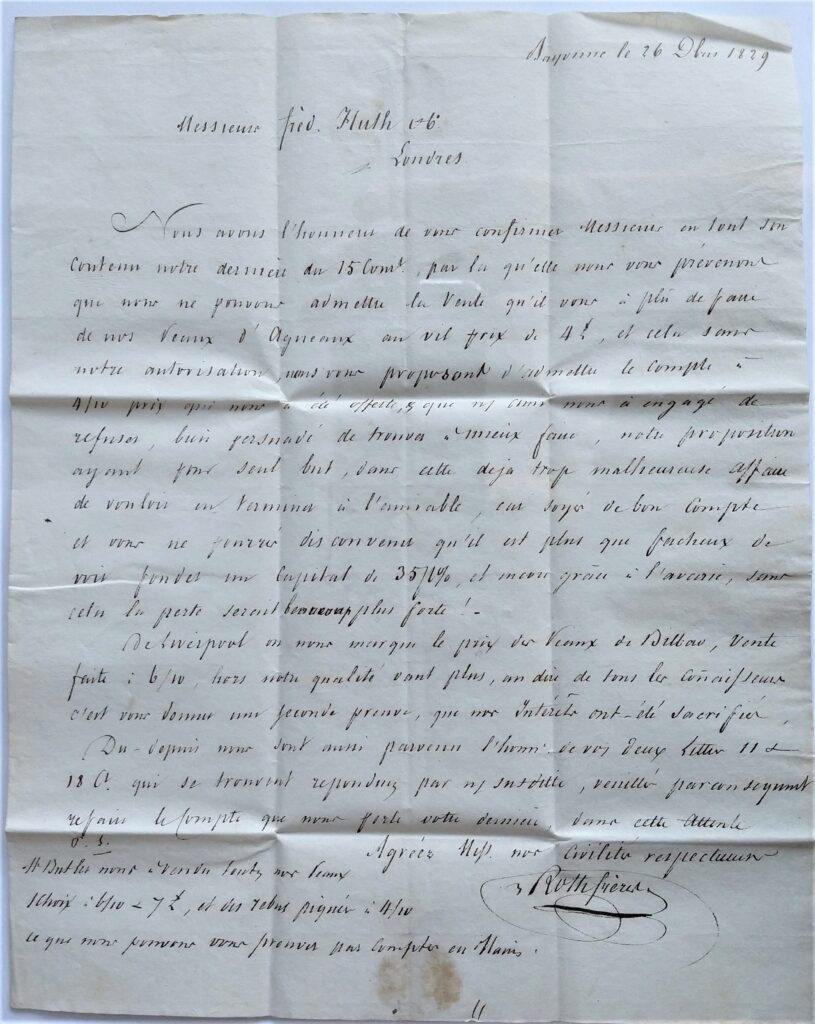
Did you think history necessarily had to be written by textbook writers and historians with PhDs? There are countless stories that deserve to be told. Everyone can be a part of it. You and I can be part of it. Actually, there are far too few who practice the ancient art of preserving history through short stories. My nerdy soul is quivering with excitement and anticipation at being allowed to be a part of it. My column, Point to Paper, is precisely about telling stories that might never have been told if I hadn’t done it.
I have one more offer to you today. It’s about your future career. Perhaps you are dreaming about conducting international trade. Perhaps you would like to establish your own bank. Wouldn’t that be nice? That’s exactly what Frederick managed to do before he turned 35. Would you like to know some of his business secrets? The author of the book on Frederick Huth & Co., Manuel Llorca-Jaña (2016), has made a list of what he believes were the keys to Frederick’s success:
- Be flexible enough to adapt to your customers’ needs, but always set a cap on the amount of money you are willing to lend to a single customer and a single trade.
- It is wise to trade on commission in markets you know and with goods you know.
- It is wise to mainly lend with security in something that you have control over.
- You can sometimes make exceptions to the security requirement. This requires that you deal with people you know are honest and in whom you have full confidence. It requires that a person has had a good reputation over a long period of time.
- It is wise to nurture friendship and trade with anyone who is interested, but you must keep a close eye on their finances and business.
- It is wise to gather as much information as possible about all parties in any trade, to be up to date on the markets to be traded in and to know as much as possible about the goods to be bought and sold.
- It is wise to limit trade, lending and insurance in times of crisis.
- Always work to share the risk with others as much as possible even if it means making a little less money.
Frederik Huth & Co. wrote with more than 6,000 correspondents in the period 1812-1850. He had 31 contacts in Norway alone. One of them lived in Christiania. His name was Andreas Grüning. He was a first-generation immigrant born in Hamburg. When Andreas died in 1842, Hans Faye from Drammen took over the company. Faye (1797-1852) was born in Drammen. He was the son of Amund Linnes Faye who was a sailmaker at Bragernes. His father died when Hans was only five years old. Hans was then taken in by Peder Høeg Smith, who also lived at Bragernes.
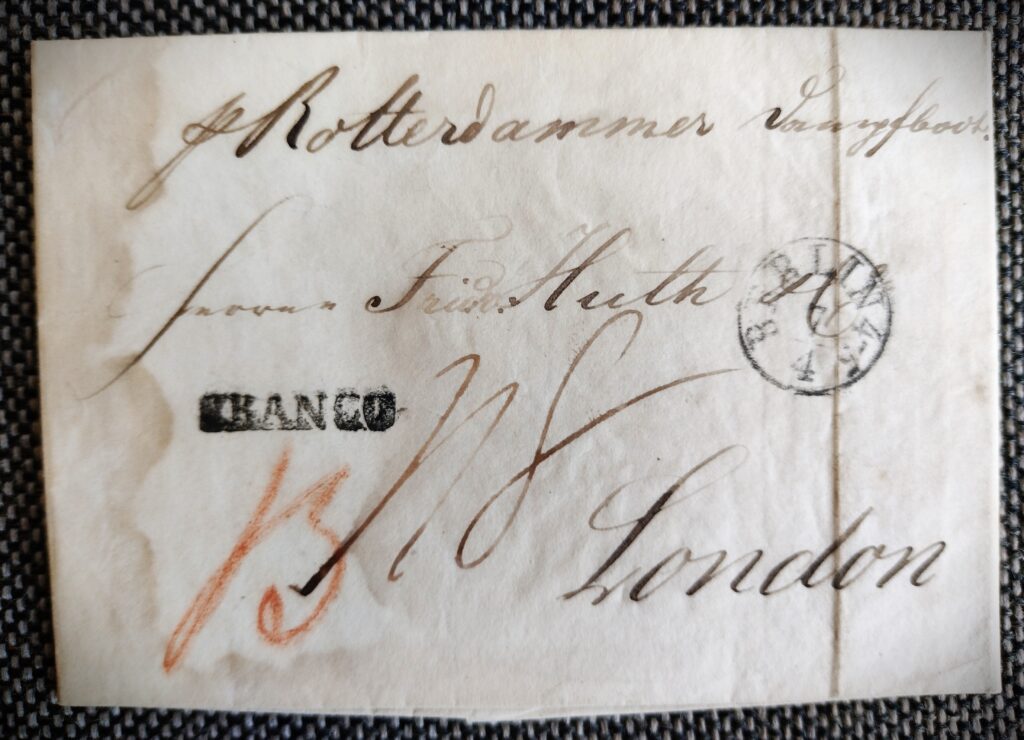
During his lifetime, Andreas Grüning owned, among other things, Odals Verk in Sør-Odal, the bank A. Grüning/Grünning & Co and had shares in and managed the famous Norwegian Hafslund estate. He also owned plots of land in Christiania (Oslo) which today are important for our national identity. Among other things, he owned the area called Grüning’s løkke in Christiania. It was an area that included Eidsvolls Plass. This is the area in front of the Norwegian Parliament. It also includes the site where the city hall of Oslo stands today. In Grüning’s garden, which was on Grüning’s løkke, a famous party was held in 1840. Among the guests were many key figures and builders of the Norwegian nation. Dagne Groven Myhren writes (2017)(translated to English):
“Just under 200 people held a celebratory dinner in “Grüning’s garden” on Konsul Grüning’s løkke, which must not be confused with Grünerløkka (currently a popular district in Oslo [my comment]). (…) During the dinner, toasts were sung and speeches were made. One of the songs was by the poet Andreas Munch, and one of the speakers was the upcoming Prime Minister, Frederik Stang. The other songs were written by Wergeland, for the king, for the country, Norwegian literature and – for freedom of the press.”
The party in the garden of Consul Grüning on 24 June 1840 was in honor of Gutenberg’s invention of the art of printing. That same morning, Henrik Wergeland had performed his newly composed cantata “Vord Lys!” (Be Light!) to pay tribute to Gutenberg’s feat. It was performed with music in Vor Frelsers Kirke (Oslo Cathedral). The church was packed.
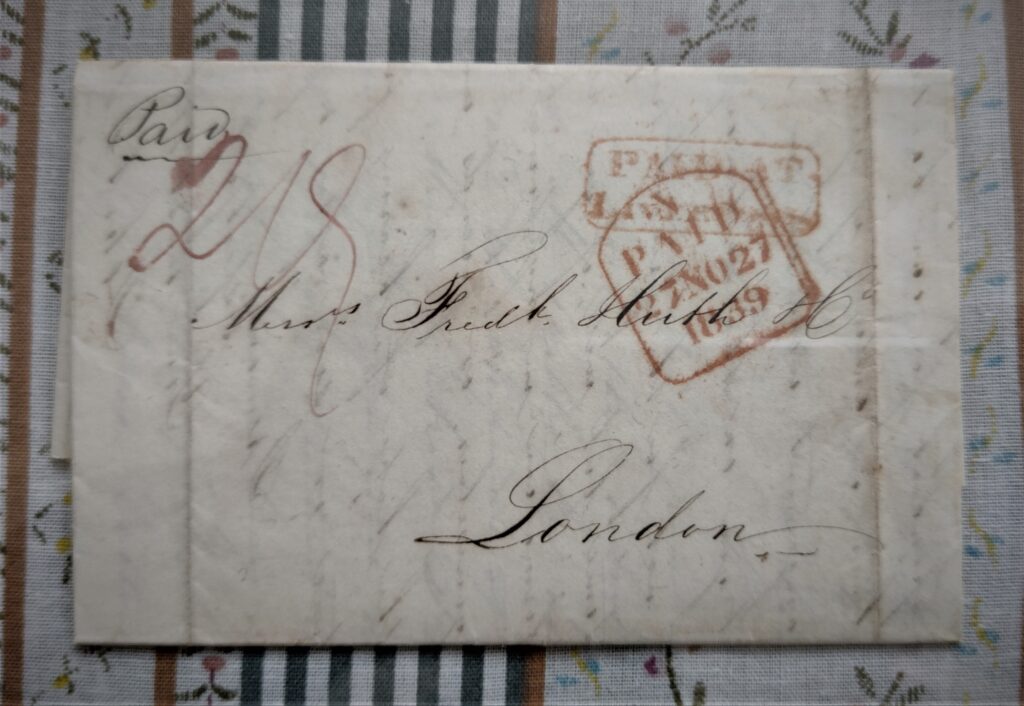
Andreas Grüning’s bank is also mentioned in the diaries of the famous Anne Lister: “Difficulty in finding Gruning and company till 12.10, then left them to settle and walked about the quays near ¾ hour (…) back to the bank – exchange at 4 speciedaler 116 shilling per £1” – Anne Lister, Travel Journal 1 August 1839 . Do you think there is something familiar about the name? You may have seen the TV series Gentleman Jack on HBO. It is about the life of Anne Lister. She lived an unusual life in her time. She chose a non-traditional role both as an early businesswoman and through living in an unusual relationship. Yvonne Haugen writes (2020):
« On Sunday the 28th of July 1839 Anne Lister and wife Ann Walker enter Norway from Sweden via ferry across Svinesund. For a fortnight they travel by horse and carriage from the Swedish border up to Christiania (Oslo), through Bærum and Drammen to Bolkesjø, hoping for a good look at the Gaustad mountain. Returning to Christiania much the same way, they then enter the Prinds Carl and set sail back to Gothenburg. «
Fredrik Huth traded timber, silver, mercury, spices, indigo, cotton, wool and woven fabrics, to name only a few of the goods he handled. He also made money from information, insurance and loans. His network greatly benefited from the exchange of information and they often knew more than most about the commodities and markets they traded in. From their head office in London alone, Huth & Co. wrote between 25-60 business letters every day. They sent up to 15,000 business letters a year. Everything was written with a dip pen and ink on paper.
The timing of establishing the company was perfect. The peace after the Napoleonic wars, the Spanish collapse opening Brazil, the start of the British industrial revolution, the construction of railways and the opening of India and China offered endless opportunities. All of these were important elements of the success of the trading house and the bank Huth & Co.
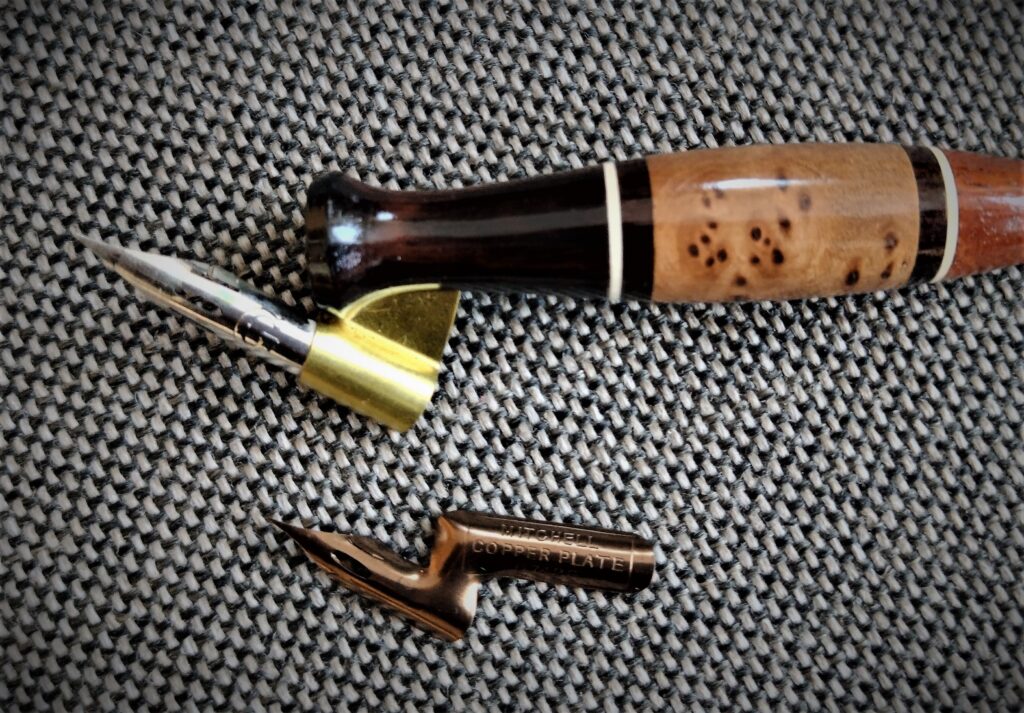
Finally, you will get to know one of the longer letters I have obtained from this interesting company. The letter is unique. The writing in the letter is incredibly beautiful. It is relatively easy to read. I have nevertheless chosen to write it in print for those who are not so used to this type of handwriting. The letter is written with a razor-sharp nib and presumably with an oblique (slanted) pen nib holder . The font is called copperplate and is actually within reach for most people to achieve with a little patience. It requires the right equipment though. You can buy a quality pen nib holder for about $10 and some extra nice and flexible nibs for an additional $10. Iron gall ink is the perfect accessory. Iron gall ink gives the opportunity to make extra thin lines. Remember to wash the new nib with toothpaste before first use and rinse well with clean water. Wear gloves! That way, you avoid getting grease on the nib from your fingers. It helps the nib to hold more ink. Lick the nib before your for dip it the first time (not between each dip or you will get a black tongue). The enzymes in your saliva will improve the flow of the ink. Rinse the nib thoroughly with water and dry it when you’re done. Iron gall ink makes the metal nib corrode and rust. Nibs for dip pens only last a while. One of my favorites is the Zebra G-nib (see picture above).

The letter that follows was written by the businessman John B. Hellyer who ran a business in Puerto Cabello in Venezuela. He was looking for a good bank connection in London. In the letter, he shares what he is doing and what he can achieve. He also presents his contacts to convince Frederick Huth & Co. that he can be trusted. Here is the letter:
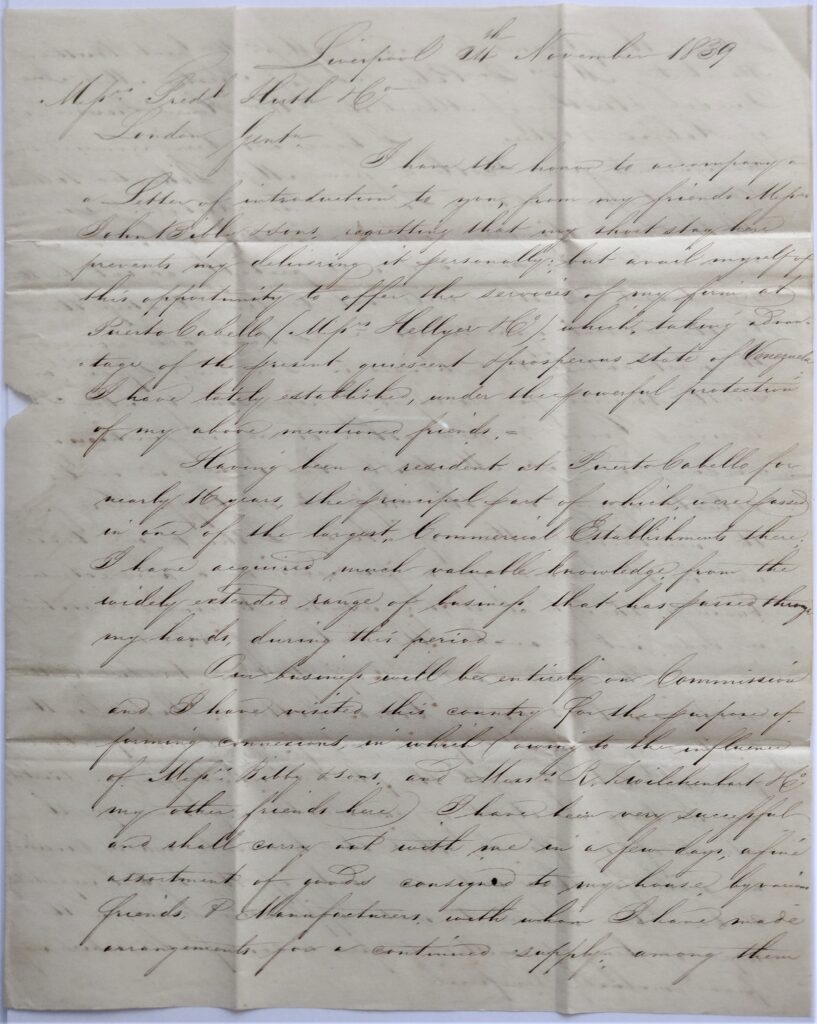
Liverpool 24 th November 1839
Messrs. Fredk (My comment: Frederick) Huth & Co
London
Gentlemen,
I have the honor to accompany a “Letter of introduction” to you, from my friends Messrs. John Bibby & sons regretting that my short stay here prevents my delivering it personally, but avail myself of this opportunity to offer the services of my firm at Puerto Cabello (Messrs. Hellyer & Co.) which, taking advantage of the present quiescent & prosperous state of Venezuela, I have recently established, under the powerful protection of my above mentioned friends.
Having been a resident at Puerto Cabello for nearly 16 years, the principal part of which were passed in one of the largest Commercial Establishments there, I have acquired much valuable knowledge from the widely extended range of business that has passed through my hands during this period .
Our business will be entirely on Commission and I have visited this country for the purpose of forming connections in which coming to the influence of Messrs. Bibby & sons, and Messrs. R. Twilchenbart & Co. my other friends here. I have been very successful and shall carry out with me in a few days, a fine assortment of goods consigned to my house by various friends & Manufacturers with whom I have made arrangements for a continued supply among them
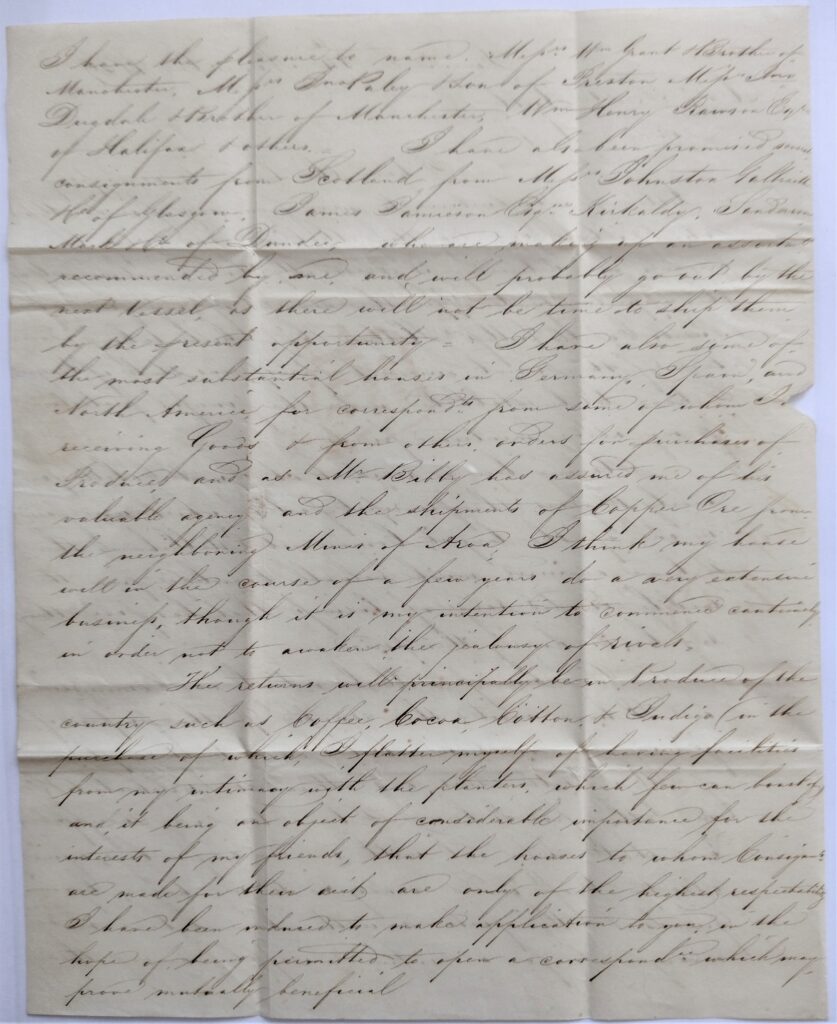
Page 2
I have the pleasure to name Messrs. Mr Wm (My comment: William) Grant & Brother of Manchester, Messrs. Jn (My comment: John) Paley & son of Preston, Messrs. Jn (My comment: John) Dugdale & Brother of Manchester, Mr. Wm (My comment: William) Henry Rawson Esq of Halifax & others. I have also been promised several consignments from Scotland from Messrs. Johnston Galbraith & Co. of Glasgow, James Jamieson Esq. Kirkaldy, Sanderson Mark & Co. of Dundee, who are making up an assortment recommended by me and will probably go out by the next Vessel, as there will not be time to ship them by the present opportunity. I also have some of the most substantial houses in Germany, Spain and North America for correspondence, from some of whom I am receiving Goods & from others orders for purchases of Produce, and as Mr. Bibby has assured me of his valuable agency and the shipments of Copper Ore from the neighboring Mines of Aroa (My comment: copper mines in the state of Yaracuy, Venezuela) . I think my house will in the course of a few years do a very extensive business, although it is my intention to begin cautiously in order not to awaken the jealousy of rivals.
The returns will principally be in Produce of the country such as Coffee, Cocoa, Cotton & Indigo (in the purchase of which, I flatter myself of having facilities from my intimacy with the planters, which few can boast of) and, it being an object of considerable importance for the interest of my friends, that the houses to whom Consignments are made for their aid are only of the highest respectability. I have been induced to make an application to you in the hope of being permitted to open a correspondence which may prove mutually beneficial.
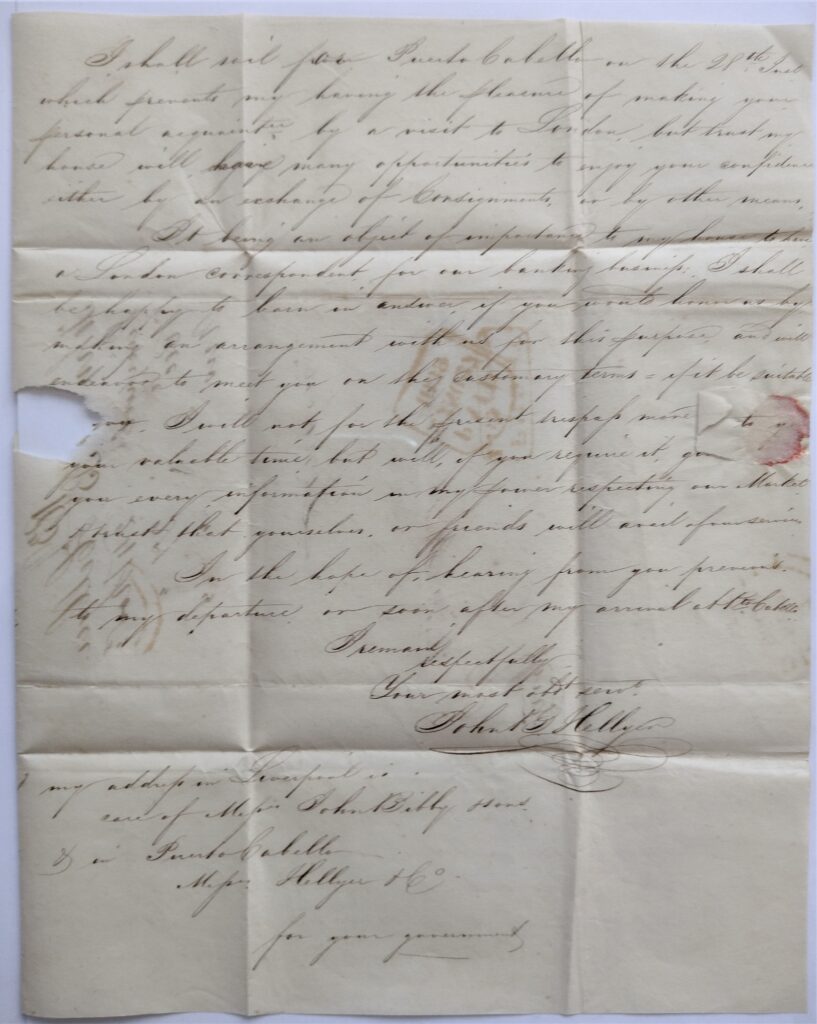
Page 3
I shall sail for Puerto Cabello on the 28th . Just which prevents me having the pleasure of making your personal acquaintance by a visit to London, but trust my house will have many opportunities to enjoy your confidence either by an exchange of Consignments or by other means.
It being an object of importance to my house to have a London correspondent for our banking business. I shall be happy to learn in answer if you want to honor us by making an arrangement with us for this purpose and will endeavor to meet you on the customary terms if it be suitable to you. I will not, for the present trespass more on your valuable time, but will, if you require it, give you every information in my power respecting our Market trust that yourselves, or friends will avail of our services.
In the hope of hearing from you before my departure or soon after my arrival at Puerto Cabello.
I remain
respectfully
Your most obedient servant
John B. Hellyer
My address in Liverpool is
care of Messrs. John Bibby & Sons
& in Puerto Cabello
Messrs. Hellyer & Co.
for your government
Sources
Manuel Llorca-Jaña (2016). The Globalization of Merchant Banking before 1850 – The case and Huth & Co. Routledge
Dagne Groven Myhren (2017). The God of Light and the tongue of the metal letter – introduction to “Vord lys” 17 June 2017 . http://blog.suttung.no/2018/03/lysets-gud-og-metallbokstavens-tunge-inllnedning-til-vord-lys-17-juni-2017/#sdfootnote16sym
Yvonne Haugen (2020). Anne Lister Norway – Anne Lister’s travels in Norway . Blog: https://www.annelistnorway.com/
You can also follow the links in the text with bluye lettering.
Photos
All photos were taken by Kjartan Skogly Kversøy.